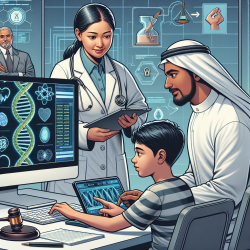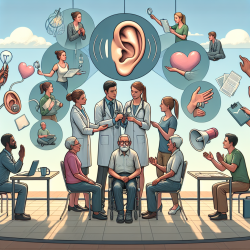Introduction
In the evolving landscape of genomics, the development of large-scale de-identified biomedical databases presents both opportunities and challenges for various fields, including speech-language pathology. The research article titled The development of large-scale de-identified biomedical databases in the age of genomics—principles and challenges by Dankar et al. (2018) provides a comprehensive overview of these databases and their implications for healthcare and research. This blog explores how speech-language pathologists can leverage the insights from this research to enhance their practice, particularly in the context of online therapy services like those offered by TinyEYE.
Understanding the Role of Genomic Databases
Genomic databases are integral to advancing biomedical research by providing a vast repository of genetic and phenotypic data. These databases facilitate the identification of genetic markers associated with various conditions, including speech and language disorders. By integrating genomic data with clinical records, practitioners can gain a deeper understanding of the genetic underpinnings of these disorders, leading to more personalized and effective interventions.
Data Privacy and Governance
One of the primary challenges highlighted in the research is ensuring data privacy and governance. As genomic databases grow, the risk of data breaches increases, necessitating robust data protection measures. Speech-language pathologists must be aware of these challenges and advocate for stringent data governance policies when utilizing genomic data in their practice. This includes understanding the ethical considerations and legal frameworks governing data use and ensuring that patient confidentiality is maintained.
Implementing Genomic Insights in Speech Therapy
Integrating genomic insights into speech therapy can lead to more targeted and effective interventions. For instance, identifying genetic predispositions to speech and language disorders can help practitioners tailor therapy plans to address specific needs. This personalized approach can improve therapy outcomes and enhance the overall efficacy of online therapy services.
- Utilize genetic markers to identify at-risk children early.
- Develop personalized therapy plans based on genetic insights.
- Monitor therapy outcomes and adjust interventions as needed.
Encouraging Further Research
While the integration of genomic data into speech therapy holds promise, it is essential to continue research in this area. Practitioners are encouraged to engage in ongoing professional development and collaborate with researchers to explore new methodologies and technologies. This collaborative approach can lead to innovative solutions and improved outcomes for children receiving speech therapy.
Conclusion
The development of large-scale genomic databases presents both opportunities and challenges for speech-language pathologists. By understanding and addressing data privacy concerns and integrating genomic insights into therapy practices, practitioners can enhance the effectiveness of their interventions. As we continue to explore the potential of genomic data, ongoing research and collaboration will be crucial in advancing the field and improving outcomes for children.
To read the original research paper, please follow this link: The development of large-scale de-identified biomedical databases in the age of genomics—principles and challenges.










